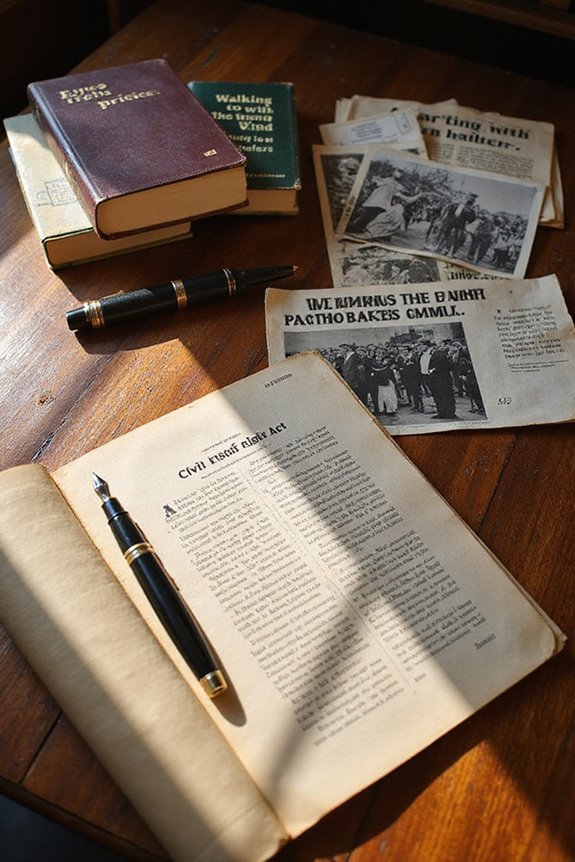Political books about civil rights illuminate historical struggles and explore ongoing challenges. They encompass biographies of figures like Medgar Evers and Malcolm X, detailing their contributions. Foundational works discuss pivotal legislation such as the Civil Rights Act of 1964. Additionally, intersectionality is examined, highlighting the unique experiences of marginalized groups. Anti-racist philosophies and their implications for social change are also covered. These texts provide valuable insights, guiding us to understand the complexities of civil rights further.
Key Takeaways
- “The Autobiography of Malcolm X” provides insight into the philosophy of self-defense and the complexities of race relations in America.
- “The Fire Next Time” by James Baldwin explores racial tensions and the emotional struggles of African Americans, emphasizing the need for justice and understanding.
- “Just Mercy” by Bryan Stevenson highlights systemic injustices within the criminal justice system and advocates for reform and compassion.
- “March” by John Lewis documents the civil rights movement through personal experiences, inspiring youth to engage in social justice activism.
- “The New Jim Crow” by Michelle Alexander critiques mass incarceration as a modern racial caste system, urging readers to confront systemic racism.
Key Biographies of Civil Rights Figures
When we explore the biographies of key figures in the civil rights movement, we uncover the diverse narratives that shaped their activism and ideologies.
- Medgar Evers served as the NAACP’s first Mississippi field secretary, showcasing his courageous fight against white supremacy until his assassination in 1963. His legacy is a reminder of the violence and racism that many activists faced during this critical era and highlights the importance of theological integrity in understanding the moral foundation of their struggles.
- Malcolm X and Martin Luther King Jr. offer contrasting leadership legacies; their biographical influences highlight differing approaches to activism—self-defense versus nonviolence.
- Dorothy Height led the National Council of Negro Women, providing critical insights into racial injustice through her autobiographical accounts.
- Coretta Scott King continued her husband’s legacy, advocating for civil rights and feminist causes posthumously.
- Dovey Johnson Roundtree exemplifies the intersection of legal advocacy and civil rights, winning landmark cases for desegregation.
These biographies remain essential for understanding the movement’s impact.
Histories and Narratives of the Civil Rights Movement

The histories and narratives of the Civil Rights Movement offer a thorough view of the struggle for racial equality in America. These Civil Rights Narratives showcase pivotal events and key figures that shaped this transformative era.
- Legal Milestones: Landmark cases like *Brown v. Board of Education* and *Loving v. Virginia* challenged segregation and discriminatory laws. The Civil Rights Act of 1964 further aimed to prevent racial discrimination in various facets of public life, highlighting the importance of collaborative efforts among activists and lawmakers.
- Direct Action: Movements such as the Montgomery Bus Boycott and Freedom Rides highlighted grassroots activism and community mobilization, which were essential in pushing for legislative changes.
- Key Events: The March on Washington and Selma’s march underscored the urgency for change, with significant public turnout, and the involvement of organizations like SNCC and SCLC facilitated a unified front for civil rights.
These Movement Histories emphasize the collaborative efforts of organizations like SNCC and SCLC, illustrating how diverse strategies merged to advance civil rights across the nation.
Foundational Works on Civil Rights Legislation

Foundational works on civil rights legislation provide essential insights into the legal frameworks that protect individual rights in the United States.
These texts are critical for understanding foundational statutes such as the Civil Rights Act of 1964 and the Voting Rights Act of 1965. They explore legislative analysis related to Section 1983, which allows individuals to sue state actors for constitutional violations. Additionally, understanding the role of democracy is crucial for contextualizing the historical and ongoing struggles for civil rights.
Key resources include:
- *Civil Rights Legislation: Cases and Materials*, which compiles crucial case law.
- *Federal Civil Rights Acts* by Rodney Smolla, offering detailed analyses of the ADA and RFRA.
- *Section 1983 Litigation*, providing guidance on civil rights claims.
These works enhance our comprehension of civil rights laws and their evolution, ensuring we appreciate their ongoing significance in American society. Additionally, the *Civil Rights Legislation: Cases and Materials* discusses qualified immunity, a critical legal principle that has significant implications for civil rights claims.
Intersectionality and Gender in Civil Rights

Understanding the evolution of civil rights legislation sets the stage for examining intersectionality and gender within this context.
- Kimberlé Crenshaw coined “intersectionality” to highlight how race and gender impact African-American women’s experiences uniquely.
- Early activists like Anna Julia Cooper laid the groundwork for understanding systemic racism and sexism as interconnected.
- The Combahee River Collective emphasized the importance of addressing interlocking oppressions, advocating for a more inclusive approach.
- Legal cases often fail to recognize combined racial and gender discrimination, leaving marginalized identities vulnerable.
- Intersectional feminism critiques traditional feminist movements for sidelining issues pertinent to women of color.
- This framework is vital for reforming policies to guarantee thorough civil rights protections that reflect the complexities of identity, as intersectionality serves as an ideological tool in various social justice movements. Additionally, historical context is essential for understanding the evolution of civil rights ideas, as it reveals how systemic injustices have shaped current debates and policies.
Anti-Racist Thought and Activist Philosophy

Anti-racist thought and activist philosophy have evolved greatly, shaping our approach to race, discrimination, and social justice. We recognize the philosophical foundations of anti-racist philosophy emerging in the late 20th century, rooted in critical theory. This framework examines race as a social construct rather than a biological reality, emphasizing the systemic nature of racism.
Core principles include:
- Opposing discrimination and inequality through both theory and praxis.
- Encouraging ongoing self-education about privileges and biases.
- Challenging systemic inequalities and transforming societal structures. Additionally, understanding the importance of accountability in addressing systemic issues is crucial for effective activism.
Historical movements, like abolitionism, laid the groundwork for contemporary anti-racist activism. By engaging with these philosophical roots, we can better confront racial trauma and promote social justice within our communities, fostering a more equitable future. The Critical Philosophy of Race critiques Eurocentric philosophical resources and highlights the need for a deeper understanding of racial domination.
Civil Rights Movement and Social Change Literature
The literature surrounding the Civil Rights Movement serves as an essential resource for understanding social change and its historical implications.
- Historical Narratives: They reveal localized activism’s role in shaping broader movements, showcasing intersections of gender, labor, and race. Furthermore, the activism in the South Carolina Sea Island Citizenship Schools highlights the importance of grassroots education in empowering communities.
- Key Authors: Writers like Ralph Ellison and James Baldwin utilize narrative strategies that document lived experiences, emphasizing emotional and political complexities.
- Memoirs: Accounts from leaders like John Lewis provide insights into the evolution of protest culture, highlighting tensions within the movement.
- Youth Literature: Works like *March* engage younger audiences, promoting empathy and awareness through accessible storytelling.
Together, these texts demonstrate literature’s impact on civil rights discourse, fostering ongoing dialogue about racial justice and social change.
Frequently Asked Questions
What Are Some Recommended Contemporary Civil Rights Books?
Did you know that nearly 80% of Americans support civil rights reforms? We recommend contemporary narratives like *We Refuse* and *Police Against the Movement*, which provide intersectional analysis of activism and resistance in today’s society.
How Can I Get Involved in Civil Rights Activism Today?
To get involved in civil rights activism today, we can participate in community outreach programs and support local initiatives. Together, we’ll amplify our voices and advocate for justice, equality, and the protection of civil rights.
What Is the Impact of Social Media on Civil Rights Movements?
We can’t ignore how digital activism reshapes social movements today. Social media amplifies voices, ignites urgent conversations, and mobilizes communities, driving change that resonates far beyond our screens, ultimately forging a powerful force for civil rights.
Are There Civil Rights Organizations That Accept Volunteers?
Yes, there’re numerous civil rights organizations that accept volunteers. By participating in these volunteer opportunities, we can enhance our community engagement and make a meaningful impact on civil liberties and social justice initiatives together.
How Do Civil Rights Issues Intersect With Environmental Justice?
We recognize that civil rights issues intersect with environmental justice through systemic inequality. Environmental policies often neglect marginalized communities, leading to disproportionate pollution exposure and health risks. Together, we must advocate for equitable solutions that address these injustices.







